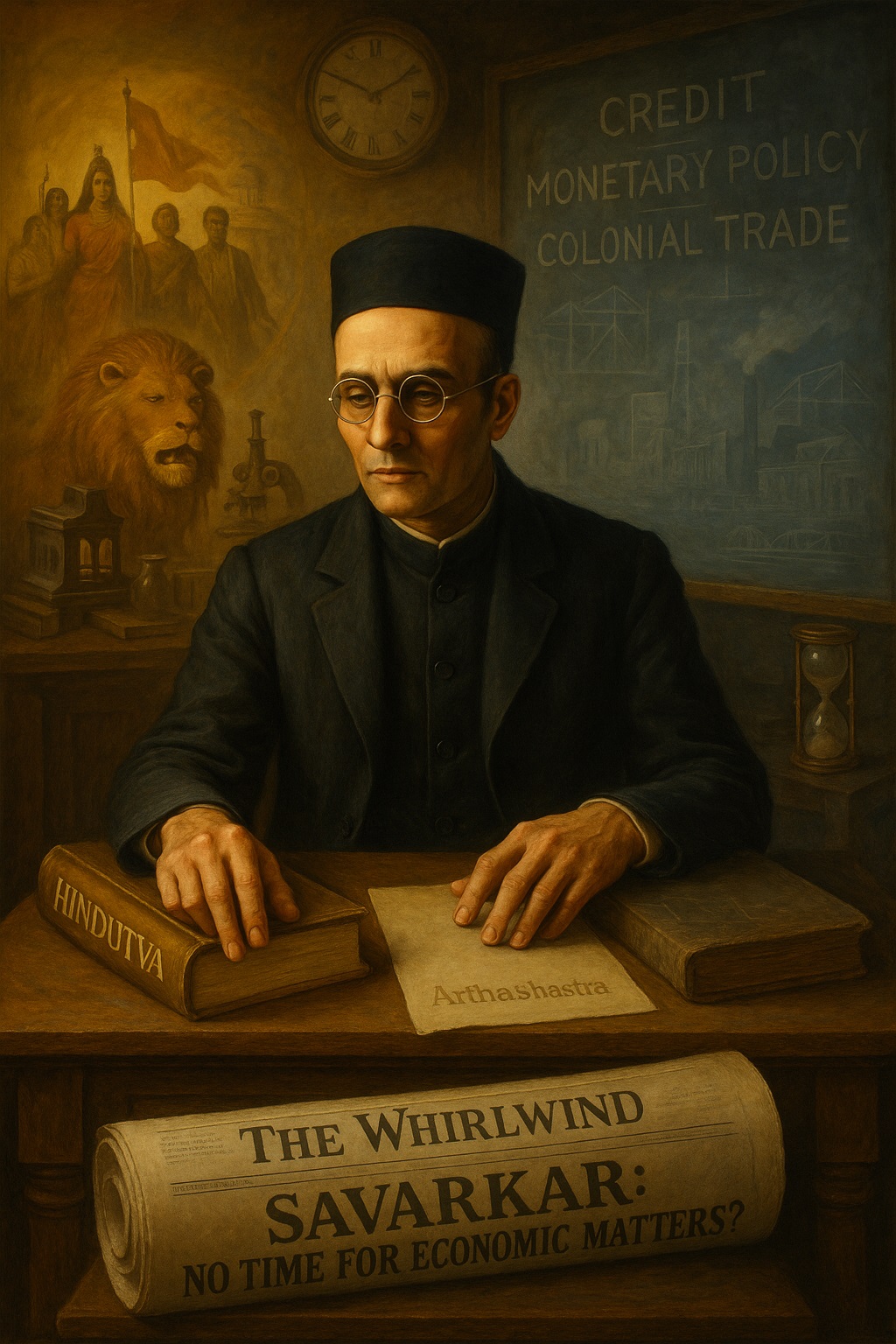Economic Dimension of Hindutva, Part 4
Vinayak Damodar Savarkar is often remembered for his strong ideological stance on nationalism, Hindutva, and socio-political issues. However, when it comes to the realm of economic policy, his contributions and ideas have remained largely under-explored. This is perhaps surprising, given that Savarkar, in his vision for the Hindu Rashtra (Hindu Nation), envisioned a community based on modernity, scientific knowledge, and forward-thinking progress.
Yet, Savarkar did not present a comprehensive or detailed economic policy, leaving a gap in the discussion of his broader ideological framework. His work on economics does not offer a fully fleshed-out vision of postcolonial economic structures. Instead, he focused on broad principles and fundamental ideas, providing little in the way of detailed economic solutions. This lack of economic theory, especially considering the importance of economic development in a postcolonial context, raises the question: why did Savarkar fail to address this vital area of policy?
Lack of Economic Education and Time Constraints
One explanation lies in Savarkar’s limited economic education. He did not possess a profound understanding of economic systems, which may have contributed to his reluctance to develop a robust economic framework. Instead, Savarkar concentrated on socio-political challenges, particularly the question of India’s partition. Preventing the division of British India into two nations was at the forefront of his mind, and he was willing to exhaust all available means to prevent it. As a result, many other issues – including economic policies – took a backseat during his most active years.
Furthermore, Savarkar’s limited time resources may have played a crucial role in his limited engagement with economic ideas. As he dedicated much of his intellectual and activist efforts to the socio-political upheavals surrounding the partition and the rise of Hindu nationalism, he was unable to devote the same attention to formulating a coherent economic theory. This lack of time and focus on other pressing issues could explain why economic policy remained a peripheral concern in his work.
Absence of a Coherent Economic Policy Program
Savarkar’s Hindutva ideology, while groundbreaking in many ways, did not include a well-developed economic policy program. Unlike other ideological movements or state theories, which often outlined detailed economic frameworks, Savarkar’s work remained vague on economic matters. This omission has contributed to the relative silence around the economic dimensions of his ideas in both academic and public discourse.
This lack of engagement with economic policy can be seen as one of the key reasons why Savarkar’s ideas on economics have been largely neglected by scholars. While his Hindutva has been extensively analyzed in terms of its political, cultural, and social implications, its economic aspects have remained largely unexplored. In this sense, Savarkar’s work presents a unique case of an ideology with strong political and cultural components but limited economic foresight.
The Significance of Economic Ideas in Savarkar’s Thought
Despite the absence of a fully fleshed-out economic theory, the economic ideas of Savarkar provide valuable insights into his broader philosophical outlook. Even as a “small building block” within the Hindutva concept, Savarkar’s economic thoughts are not insignificant. While they might not offer clear solutions to the economic problems of postcolonial India, they reflect his broader concerns about the future of the nation and the role of modernity, science, and technology in shaping its future.
Moreover, Savarkar’s inability or unwillingness to engage deeply with critical economic issues, such as the monetary and credit systems, is telling. These issues were of immense importance to the Indian economy and its relationship with the British colonial power. Yet, Savarkar refrained from offering concrete ideas on these matters. Some of his followers, in an attempt to fill this gap, have tried to attribute to him a more developed economic understanding than he actually possessed. However, such efforts do more harm than good, as they fail to acknowledge the real limitations of Savarkar’s economic vision and unintentionally highlight his lack of depth in this crucial area.
Final Thoughts: A Limited but Significant Contribution
In conclusion, while Savarkar may not have offered a comprehensive economic policy or theoretical framework, his limited engagement with economic issues still warrants attention. His ideas in this field, though minimal, offer a glimpse into his broader philosophical and ideological vision. Understanding Savarkar’s approach to economics – such as it was – helps us better grasp the complexities of his thought and provides a more nuanced perspective on his ideology of Hindutva.
Ultimately, Savarkar’s work on economic policy reflects a thinker deeply immersed in the socio-political struggles of his time, with limited resources and education in economic theory. While his contributions to the field of economic policy are limited, they still provide a valuable starting point for further analysis and discussion.
Do you believe a strong nationalist ideology requires a detailed economic plan? Why do you think Savarkar prioritized socio-political issues over economic policy? Considering the challenges of his time, should Savarkar have prioritized economics more? Share your insights in the comments below!
Sources:
DESHPANDE, Sudhakar. 1999. Savarkar. The Prophetic Voice. Dastane Ramchandra & Co.: Pune.
KRÜGER, Horst. 1985. Anfänge sozialistischen Denkens in Indien. Der Beginn der Rezeption sozialistischer Ideen vor 1914. Band II. Akademie-Verlag: Berlin.
PATWARDHAN, V. S. 1989. „Savarkar’s Economic Thinking“, in PHAKE, Sudhir/PURANDARE, B. M. and Bindumadhav JOSHI. (Eds.). 1989. Savarkar. Savarkar Darshan Pratishtnah (Trust): Bombai (Mumbai), 118-122.
PHADTARE, T. C. 1975. Social and Political Thought of Shri V.D. Savarkar. A Thesis submitted to the Marathwada University for the Degree of Doctor of Philosophy. Unpublished: Aurangabad.
ROTHERMUND, Dietmar. 1985. Indiens wirtschaftliche Entwicklung. Von der Kolonialherrschaft bis zur Gegenwart. Schöningh (UTB): Paderborn.
ROTHERMUND, Dietmar. 1983. The Indian Economy under British Rule and other Essays. Manohar: New Delhi.
SAVARKAR, Vinayak Damodar .2007. Hindu Rashtra Darshan. Bharat Bhushan. Abhishek Publications: New Delhi.
SAVARKAR, Vinayak Damodar. 1945. Hindu Rashtravad. Being an Exposition of the Ideology & Immediate Programme of Hindu Rashtra as outlined by Swatantrayaveer V.D. Savarkar. Rohtas Printing Press: Rohtak. (Collected & Edited by Satya Prakash).


Leave a Reply